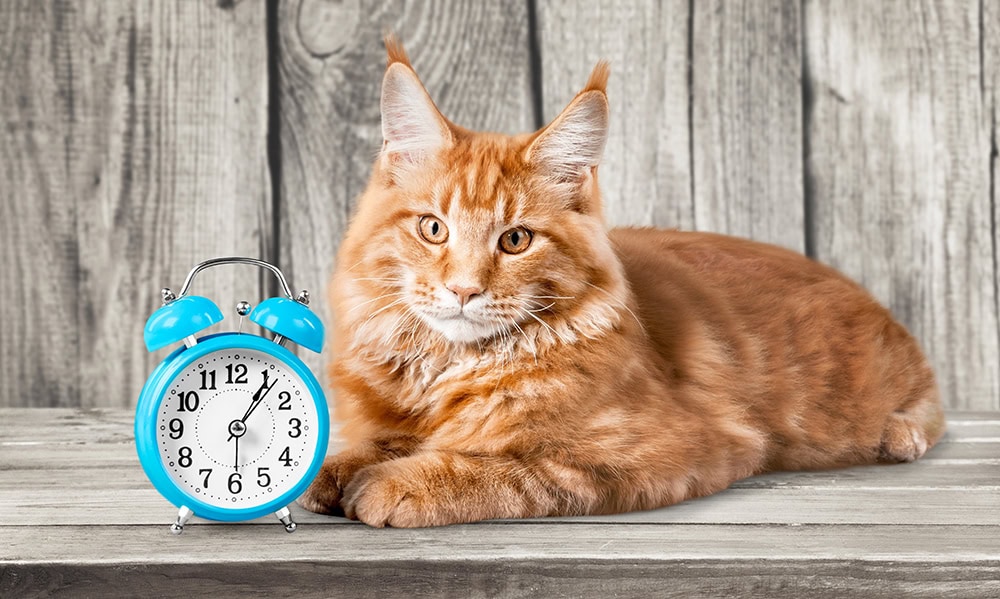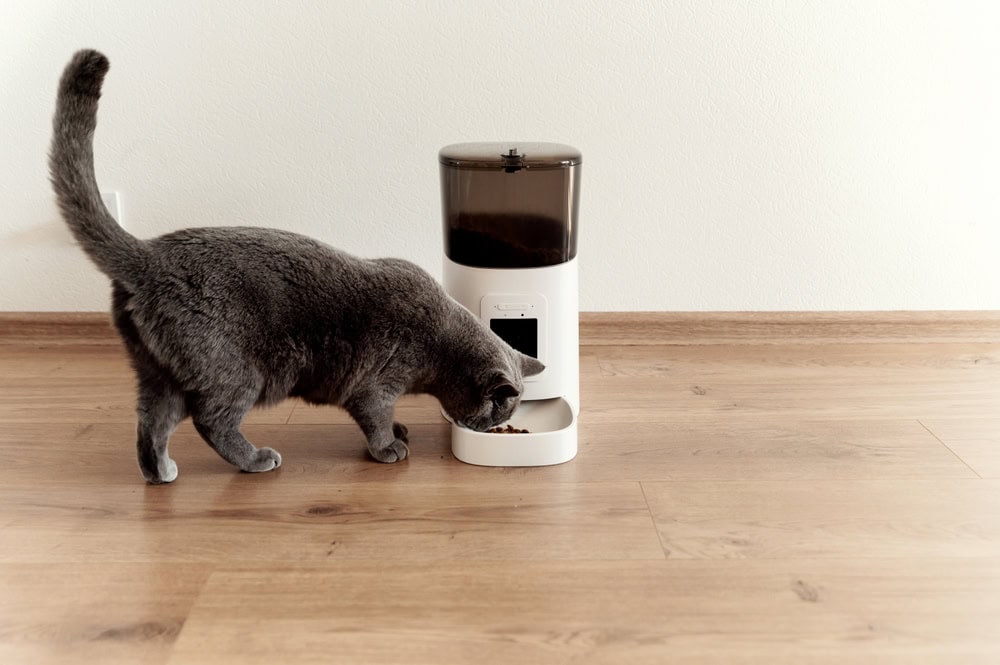Do Cats Have a Sense of Time? A Guide to Understanding Your Cat Better
By Brooke Bundy
Updated on

Does your cat always know when it’s dinnertime? Do they routinely wake you up only a few minutes before the chirping of your morning alarm? Although they can’t read clocks, cats can tell time in a limited sense. As creatures of habit, felines pick up on daily rituals and can even become anxious or offended if the day doesn’t go according to plan. They are also roughly familiar with the time of day because of the cycle of the sun and how it affects their circadian rhythm. Obviously, cats aren’t familiar with measures of time such as months and years. However, they are equipped with biological and psychological mechanisms that tell them how to spend their days.
How Do Cats Tell Time?
Everyday your cat spends an average 12-18 hours 1 sleeping. When they’re awake, they can spend up to 50% of their waking hours 2 grooming themselves, and seem most playful early in the morning and in the evening. Your cat accomplishes all of these things in a single day. And yet, they don’t have planners, alarms, or smartphone assistants reminding them of all of their daily tasks. How do cats know when it’s time to sleep or eat? Like humans, your cat’s circadian rhythm dictates a lot of their habitual activity. However, it’s possible that indoor cats may have a more irregular sleep schedule than outdoor cats since artificial light 3 can disrupt that cycle. Here are a few things that your cat knows about time, and how it applies to their days:

Cats Are Crepuscular Creatures
Although cats have a circadian rhythm like humans, theirs gives them a different schedule than ours. With the advent of artificial lighting and the move away from an agricultural lifestyle, humans are more likely to receive their rest in the middle of the dark hours through sometime into the morning, and their activity peaks in the middle of the day. Cats, however, are most active early in the morning and at dusk. Interestingly, humans were once like this, too. We arose with the sun, napped in the afternoon during the hottest part of the day, and slept in 4 hour shifts at night not too long after the sun went down. Maybe we should take a cue from our cat and take a nap more often.
Felines Thrive on Routine
If you begin a new habit such as feeding them always at 9:00 a.m. or going to bed at 11:00 p.m., your cat may be able to remember by estimating the time of day according to the light of the sun.
They Know How to Read You
Cats can sense changes in activities by your emotions and mannerisms. For instance, maybe they know you always feed them once you’re finished with your desk work. If you’ve been working intensely on a project all afternoon, but suddenly stand up to stretch, they may sense that you’re about to get started on the next task on your routine to-do list: feeding time.

Cats Have a Limited Understanding of Seasons
You won’t see your cat decorating their cat tree for Christmas, but they do have a primitive sense of the time of year because of the way the sun affects their circadian rhythms. For example, unspayed female cats often go into heat during the warmer months between February and October. This is why kitten season is said to be between April and October, although cats conceived during the later months of heat won’t be born until December. Kitten season is a good thing as it prevents kittens from being young and vulnerable during January-March, which are often the harshest times of the year for weather. Unfortunately, though, indoor cats may go into heat pretty much year-round as their circadian rhythm has been disrupted by artificial light and unnatural schedules.
What Happens If a Cat’s Sense of Time Becomes Disrupted?
Your cat may become agitated if their schedule becomes interrupted. If you always come home at 6:00 p.m., they’ll probably know to expect you once the sun goes down. They might cry or become anxious if you aren’t home for some reason.
Cats also detest change. Moving to a new house, adopting another pet, or even rearranging the furniture can be enough for some felines to go off the rails. If you think your cat is anxious because of a change in their lifestyle, adopt another routine that works better for this new season. Be sure to take extra time to reassure your cat that you’re not going anywhere.

Conclusion
Cats know their schedule like clockwork. Thanks to their circadian rhythm and their natural tendency to pick up on your habits, cats can pretty much distinguish the time of day and even seasons despite not knowing how to read numerals on a clock. If your schedule suddenly changes, make sure to establish a new normal and show your cat some extra love. Like the sun, cats depend on you for their food, shelter, and attention. They’ll take as much of your time as you’re willing to give.
Featured Image Credit: Billion Photos, Shutterstock











